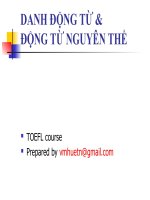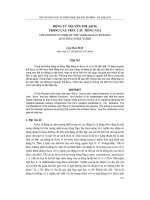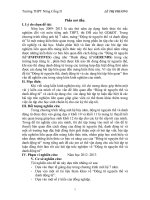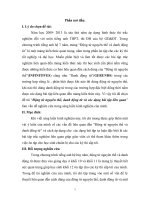Danh động từ và động từ nguyên thể
Bạn đang xem bản rút gọn của tài liệu. Xem và tải ngay bản đầy đủ của tài liệu tại đây (128.85 KB, 5 trang )
Danh động từ và động từ nguyên thể
1. Danh động từ (V-ing):
a.
Cách sử dụng của Danh động từ:
+ Là chủ ngữ của câu: dancing bored him
+ Bổ ngữ của động từ: her hobby is painting
+ Là bổ ngữ: seeing is believing
+ Sau giới từ: he was accused of smuggling
+ Sau một vài động từ
b. Một số động từ thường theo sau bằng một Danh động từ: Verb + V-ing
- admit: thừa nhận
- avoid: tránh
- consider: xem xét
- delay: hoãn
- deny: phủ nhận
- detest: ghét
- dislike: không thích
- enjoy: thích
- finish: kết thúc
- imagine: tưởng tượng
- keep: giữ
- mind: quan tâm
- miss: trễ, lỡ
- risk: liều, mạo hiểm
- postpone: hoãn
- practice: luyện tập
Ex: My father enjoys listening to classical music.
Finally, the thief admitted stealing my bicycle.
c.
Một số cụm động từ được theo sau bằng danh động từ:
- be used to / get used to: quen với / trở nên quen với việc gì
- be worth: đáng gia
- be busy: bận rộn
- can’t bear / can’t stand: không chịu đựng được
- can’t help: không thể không
- would you mind
- it’s no use / it’s no good: vô ích
- look forward to: mong đợi
Ex: I couldn’t help laughing when hearing his story.
Would you mind typing this letter?
d.
Danh động từ đi sau các giới từ
Ex: He is fond of jogging in the morning.
2. Động từ nguyên mẫu có “to”
a.
Một số động từ thường theo sau bằng động từ nguyên mẫu có “to”
- agree: đồng ý
- arrange: sắp xếp
- beg: van nài, van xin
- decide: quyết định
- demand: yêu cầu
- fail: thất bại
- hope: hy vọng
- intend: dự định
- learn: học
- plan: lên kế hoạch
- prepare: chuẩn bị
- pretend: giả vờ
- prmise: hứa
- refuse: từ chối
- seem: hình như
- want: mong muốn
- wish: ước muốn
- would like
Ex: I hope to be your good friend.
We decided to go for a walk in the forest.
b. Một số động từ theo sau bằng tân ngữ + động từ nguyên mẫu có “to”:
- advise: khuyên
- ask: hỏi
- allow: cho phép
- encourage: động viên
- expect: mong đợi
- permit: cho phép
- persuade: thuyết phục
- order: ra lệnh
- recommend: đề nghị
- request: yêu cầu
- tell: bảo
Ex: My parents allowed me to go out with my friends last night.
I recommend you to do what he said.
Note: Một số động từ có thể đi cùng với cả động từ nguyên thể và V-ing, hãy so sánh sự khác nhau
về ý nghĩa giữa chúng.
stop + V-ing: dừng hẳn một hành động
Ex: My father stopped smoking cigarette.
stop + to-inf: dừng lại để làm việc khác
Ex: He was very tired. He stopped to take a rest.
remember / forget / regret + V-ing: nhớ / quên/ nuối tiếc việc đã xảy ra rồi(trong quá khứ)
remember / forget / regret + to-inf: nhớ / quên/ nuối tiếc việc chưa, sắp xảy ra (trong tương
lai)
Ex: Don’t forget to turn off the light when you go to bed.
I remember meeting you some where but I can’t know your name.
try + V-ing: thử
try + to-inf: cố gắng
need + V-ing = need + to be + V3: cần được (bị động)
need + to-inf: cần (chủ động)
Ex: I need to wash my car.
My car is very dirty. It needs washing / to be washed.
Be used to + V-ing: quen với việc gì (ở hiện tại)
I’m used to getting up early. (tôi quen với việc dậy sớm)
Used to + V: thường làm gì trong quá khứ (bây giờ không làm nữa)
I used to get up early when I lived in Bac Giang
(tôi thường dậy sớm khi tôi sống ở Bắc Giang)
Advise/ allow/ permit/ recommend + object + to V: Khuyên/cho phép/đề nghị ai làm gì
He advised me to apply at once.
They don't allow us to park here.
Advise/ allow/ permit/ recommend + Ving: Khuyên/ cho phép/ đề nghị làm gì
He advised applying at once.
They don't allow parking here.
See / hear/ smell/ feel/ notice/ watch + object + V-ing: Cấu trúc này được sử dụng khi người
nói chỉ chứng kiến một phần của hành động:
I see him passing my house everyday.
She smelt something burning and saw smoke rising.
See / hear/ smell/ feel/ notice/ watch + object + V(nguyển thể không có 'to'): Cấu trúc này
được sử dụng khi người nói chỉ chứng kiến toàn bộ hành động:
Bài tập thực hành
Bài tập 1: Chọn dạng đúng của động từ sau:
1. The teacher decided (accepting/to accept) the paper.
2. They appreciate (to have/having) this information.
3. His father doesn’t approve of his (going/ to go) to Europe.
4. We found it very difficult (reaching/ to reach) a decision.
5. Donna is interested in (to open/opening) a bar.
6. George has no intention of (to leave/leaving) the city now.
7. We are eager (to return/returning) to school in the fall.
8. We would be better off (to buy/ buying) this car.
9. She refused (to accept/ accepting) the gift.
10. Mary regrets (to be/being) the one to have to tell him.
11. George pretended (to be/being) sick yesterday.
12. Carlos hopes (to finish/finishing) his thesis this year.
13. They agreed (to leave/leaving) early.
14. Helen was anxious (to tell/ telling) her family about her promotion.
15. We are not ready (to stop/stopping) this research at this time.
16. Henry shouldn’t risk (to drive/driving) so fast.
17. He demands (to know/knowing) what is going on.
18. She is looking forward to (return/returning) to her country.
19. There is no excuse for (to leave/leaving) the room in this condition.
20. Gerald returned to his home after (to leave/leaving) the game.
Bài tập 2: Hoàn thành mỗi câu sau với một trong các động từ sau: apply, be, be, listen, make,
see, try, use, wash, work, write. (chia động từ theo đúng dạng)
1. Could you please stop………………..so much noise?
2. I enjoy …………………to music.
3. I considered …………………..for the job but in the end I decided against it.
4. Have you finished ………………………your hair yet?
5. If you walk into the road without looking, you risk………knocked down.
6. Jim is 65 but he isn’t going to retire yet. He wants to carry on………………
7. I don’t mind you……………the phone as long as you pays for all your calls.
8. Hello! Fancy …………..you here! What a surprise!
9. I’ve put off ………………..the letter so many times. I really must do it today.
10. What a stupid thing to do! Can you imagine any body ……………..so stupid?
11. Sarah gave up …………………..to find a job in this company and decided to go abroad.
Đáp án
Bài 1:
1. to accept
2. having
3. going
4. to reach
5. opening
6. leaving
7. to return
8. buying
9. to accept
10. being
11. to be
12. to finish
13. to leave
14. to tell
15. to stop
16. driving
17. to know
18. returning
19. leaving
20. leaving
Bài 2:
1. making
2. listening
3. applying
4. washing
5. being
6. working
7. using
8. seeing
9. writing
10. being
11. trying









